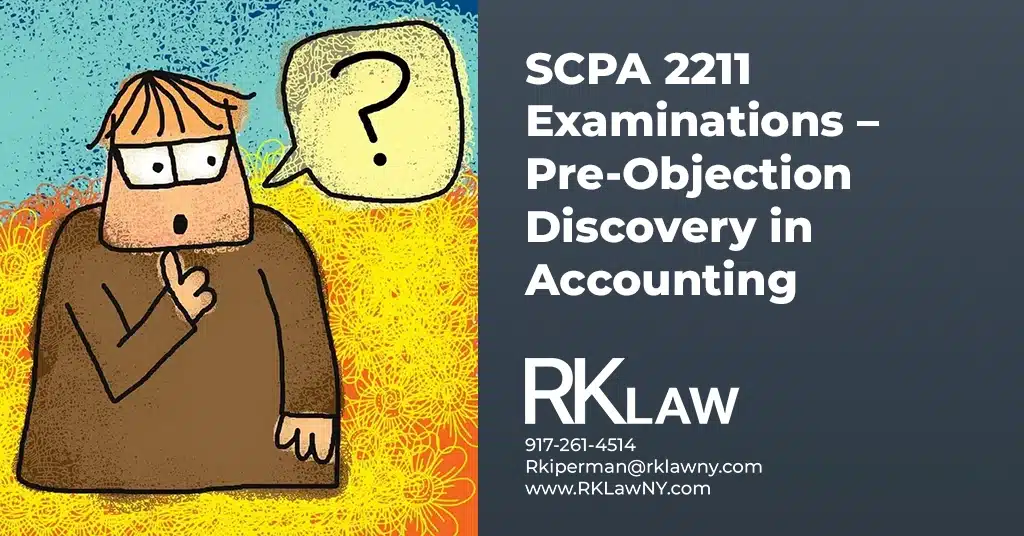SCPA 2211 examinations, like SCPA 1404 examinations, are an opportunity for a person interested in an Estate to obtain information concerning the estate. While SCPA 1404 examinations offer an opportunity to obtain information surrounding the execution of a Decedent’s Last Will and Testament, SCPA 2211 examinations offer a chance for interested parties to obtain information about the actions of the fiduciary who has been appointed as Administrator, Executor, or Trustee of an Estate or Trust. The SCPA 2211 Examination is a powerful one-sided tool for having many of your questions answered about the fiduciary’s accounting and the activities undertaken for the estate.
What are SCPA 2211 Examinations?
SCPA 2211 examinations consist of discovery (governed by CPLR Article 31). This includes discovery requests, subpoenas, interrogatories, and depositions. Under such an examination an interested party can ask questions and obtain information about all matters related to the estate. 2211 examinations can be conducted by: persons interested in the estate, creditors, the Attorney General, and Co-fiduciaries.
When Do you request SCPA 2211 Examinations?
Typically, the fiduciary (executor, administrator, trustee) will file to judicially settle his or her accounting. Following the Petition to Judicially settle the Account, the Court will issue a Citation so that it may acquire jurisdiction over the necessary parties. Upon the return date of that Citation, if an interested party has an issue with the accounting, instead of filing objections, the interested party will instead, request 2211 examinations.
Indeed, SCPA 2211(2) provides that the fiduciary may be examined under oath by any party to the proceeding either before or after filing objections, if any, to the account, as to any matter relating to his administration of the estate. You can make the request for 2211 examinations orally. At the return date of the Citation, an interested party can come up to the podium when there case is called and simply ask for the examinations. During COVID-19, when Courts are holding virtual appearances, or requiring no appearances for jurisdictional calls, you are able to request 2211 examinations by requesting the examination in writing.
Why would you request SCPA 2211 Examinations?
Requesting 2211 examinations is strategically beneficial because it is a way to conduct one sided discovery. The interested party can obtain documents and information from the fiduciary. The interested party can also depose the fiduciary. The fiduciary, on the other hand, cannot obtain documents or information from the person seeking the 2211 examinations. The fiduciary also cannot depose the person seeking the information.
What is the Scope of the SCPA 2211 Examinations?
The fiduciary can only be examined as to matters connected with the accounts he has filed and his management and administration of the estate. The interested party making the examination should have the opportunity to determine whether all estate assets have been accounted for and to verify whether the fiduciaries have taken all steps required of them in the administration of the estate.
What happens after SCPA 2211 Examinations are Completed?
After 2211 examinations are complete, the interested party can then file Objections to the accounting. In practice, it is usually agreed among the parties, by stipulation, that Objections will be filed within a specified period after the completion of the SCPA 2211 examination of the fiduciary. Of course the parties can also reach a settlement. If a settlement is reached, then the parties can resolve their difference by so ordered stipulation.
Additional resources provided by the author
We can help you request 2211 Examinations and conduct relevant discovery therein.
For more information, please contact NYC Probate Litigation, Guardianship, NYC Probate and Estate Planning attorney Regina Kiperman:
Phone: 917-261-4514
Fax: 929-556-2089
Email: rkiperman@rklawny.com
Or visit her at:
40 Wall Street
Suite 2508
New York, NY 10005
Visit Regina on LinkedIn
Visit Regina on Facebook
This page is made available by the lawyer for educational purposes only as well as to give you general information and a general understanding of the law, not to provide specific legal advice. By using this site you understand that there is no attorney client relationship between you and the lawyer. The post should not be used as a substitute for competent legal advice from a licensed professional attorney in your state. ATTORNEY ADVERTISING.
